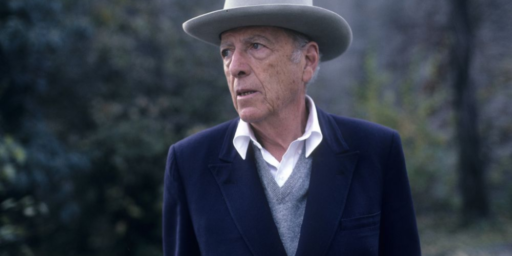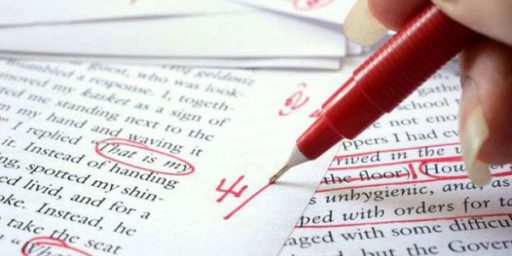Jane Austen’s Tight Prose Thanks To Editor
Jane Austen was a poor speller and sloppy grammarian but her published words were precise and exquisite thanks to her editor, William Gifford.
AP breathlessly reports, “Academic: Jane Austen had helping hand from editor.”
She’s renowned for her precise, exquisite prose, but new research shows Jane Austen was a poor speller and erratic grammarian who got a big helping hand from her editor.
Oxford University English professor Kathryn Sutherland studied 1,100 handwritten pages of unpublished work from the author of incisive social comedies such as “Pride and Prejudice.” She said Saturday that they contradicted the claim by Austen’s brother Henry that “everything came finished from her pen.”
“In reading the manuscripts, it quickly becomes clear that this delicate precision is missing,” Sutherland said. She said the papers show “blots, crossings out, messiness,” and a writer who “broke most of the rules for writing good English.” ”In particular, the high degree of polished punctuation and epigrammatic style we see in ‘Emma’ and ‘Persuasion’ is simply not there,” Sutherland said.Sutherland said letters from Austen’s publisher reveal that editor William Gifford was heavily involved in making sense of Austen’s sensibility, honing the style of her late novels “Emma” and “Persuasion.” Gifford did not edit earlier books such as “Sense and Sensibility” and “Pride and Prejudice,” whose inconsistencies have sometimes been blamed on bad printing. ”In fact, the style in these novels is much closer to Austen’s manuscript hand,” Sutherland said.
This isn’t the least bit shocking. There’s a reason publishers employ editors, after all.
I’ve never worked with literary types but have edited book manuscripts, journal articles, and blog posts written by highly intelligent subject matter experts. With rare exceptions, indeed, I was able to improve their work. It’s not necessarily that I’m a better writer than they are — in many cases, I wasn’t — but that a second, trained set of eyes — particularly ones with no emotional investment in the words on the page — can almost always spot weaknesses and suggest improvements.
It works both ways: I’ve frequently published writing where someone else edits and improves my work. Even editors need editors.







Every time I read a story about an editor improving a writer’s work, I always wonder why no one bothered to do the same for Cormac McCarthy.
And then there was Maxwell Perkins, Thomas Wolfe, and Look Homeward, Angel. The story has it that Wolfe, who was pretty tall, wrote the novel standing up using the top of a refrigerator for a desk. He put the handwritten pages in a cardboard box. He presented the “manuscript” in multiple boxes to Perkins who, with him, pared the thing down to publishable size.
The Wasteland is said to have been twice as long as what we have now. Elliot sent the ms to Pound, who cut about half of it out. Editors sometimes, most times, go unheralded, but manys the writer whose world-famous work is just so because of somebody else’s blue pencil.
“I always wonder why no one bothered to do the same for Cormac McCarthy.”
Tsk, tsk.
At the time Jane Austen wrote her novels, standardized spelling in Britain was in the infancy stage. James Boswell can be credited with trying to standardize spelling in the English language through his dictionary. However, many authors today still need to have their words corrected by an editor.
There are certain ladies who worship Jane Austen, take everything MIss Austin wrote literally, and who post on imdb so that they can argue about the most miniscule things. I hope they do not see this article as it would destroy their faith (Ha!).
BTW, James, since we’re talking about things literary, any thoughts on this?
Putting a Price on Professors
I have a collection of Percy Bysshe Shelley’s works that show his original, followed by his first editor’s inclusions, and the most modern edited works. The differences in rhythm, spelling, and use of punctuation to relay meaning is striking throughout the years is striking. A good editor can not only make prose or poetry better, but can change its entire effects.
Something Bukowski should’ve learned.